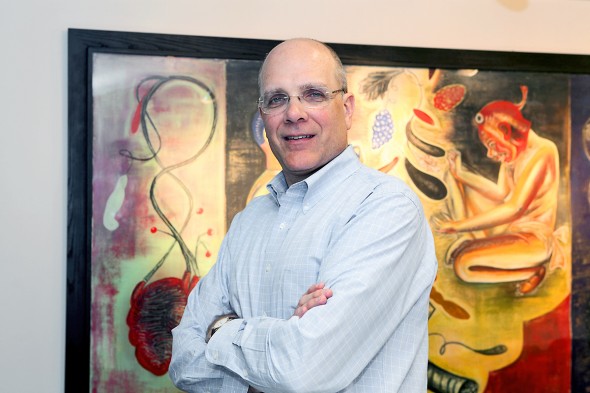Driving force behind UIC’s Urban Transportation Center

Steve Schlickman, director UIC’s Urban Transportation Center, enjoys mentoring students. “I could do that for free,” he says. Photo: Jenny Fontaine
Steve Schlickman’s first job in public transportation was driving a Georgetown University bus.
He later became the head of the RTA. Now he runs UIC’s Urban Transportation Center in the College of Urban Planning and Public Affairs.
The center is “the biggest it’s been in history,” said Schlickman, its director. “There are 33 projects we’re funding. It’s a big upswing now because we’re included in three national centers designated two years ago for an infusion of $1 million-plus a year in addition to IDOT funding.”
Besides administering the center, Schlickman is engaged in some research of his own. “I’m not a trained researcher,” he said. “When I joined the university in 2010, my expertise was in the funding of transportation projects — I had a history of chasing money.”
That includes the national passenger facility charge, tacking $4.50 onto airline tickets, that financed the O’Hare Airport expansion and Midway Airport redevelopment.
Schlickman is active in civic activities related to transportation. He’s on the board of the Center for Neighborhood Technology and its nonprofit subsidiary, Alternative Transportation for Chicagoland, as well as the Active Transportation Alliance and the Neighborhood Capital Institute, a startup that raises funds for disadvantaged communities.
He enjoys mentoring and advising students. “I could do that for free.”
Schlickman was executive director of the RTA for five years before he came to UIC. The agency oversees the CTA, the Metra commuter rail system and the Pace suburban bus program.
His major frustration was that the RTA lacks the authority — ironically, that’s what the “A” in RTA stands for — to coordinate the three agencies effectively.
“It takes persuasion, effort and time to get the three operators to follow your lead,” Schlickman said. “Your authority is compromised by the politics of the RTA board and the ability of the agencies to influence the RTA board. Any important decision can be stopped by any five directors of the 16-member board.”
As a result, “the RTA board and the three operating agencies cannot really operate to create the best integrated transit system,” he said. “If you were to form a private company to run a transportation system to achieve a profit, you would never set it up this way.”
The solution is to roll everything into a single agency, he said. Los Angeles and San Francisco are the only other major cities without a unified system.
“I left because it was a very challenging job and quite frankly, I got tired of it.”
He contrasted that experience with what he’s doing now. “The nice thing about working at the university is that we’re all pulling in one direction, supporting each other,” he said.
His summer driving a bus at Georgetown in 1975, where he had just received a bachelor’s degree in government, led to a year as dispatcher and safety director and a four-month internship with the U.S. Department of Transportation in Washington, D.C.
He earned a law degree from DePaul University, but “I didn’t want to practice, or advocate in a litigious way.” From 1980 to 1988 he held a variety of posts with the CTA. Recruited by RTA chairman Sam Skinner, he worked in intergovernmental relations and public affairs for a year and a half.
He spent nearly three years working on the city’s behalf in Washington, D.C., then the following four years overseeing the ill-fated plan to build a light-rail system in downtown Chicago. He worked in the private sector for nearly 10 years before going to the RTA.
Schlickman, who grew up in Arlington Heights, lives in the South Loop with his wife, Alison. She retired from the Federal Reserve Bank two years ago. They have a son, Pat, 31, a lawyer in New York City, and a daughter, Christy, 27, a special education teacher at Park School in Evanston.
The couple has a second home in Colorado. “We love the mountains, skiing and horseback riding,” he said.
In the city, Schlickman walks and takes public transit. “We own a car but rarely use it,” he said.
Categories
Topics
